'I feel a reckoning' Reese Witherspoon on the most important fight of her career
She's spearheaded the Time's Up initiative, has a whopping 23 projects and several successful businesses under her belt. Award-winning actress and producer Reese Witherspoon doesn't do downtime. Anne Fulenwider meets Hollywood's powerhouse
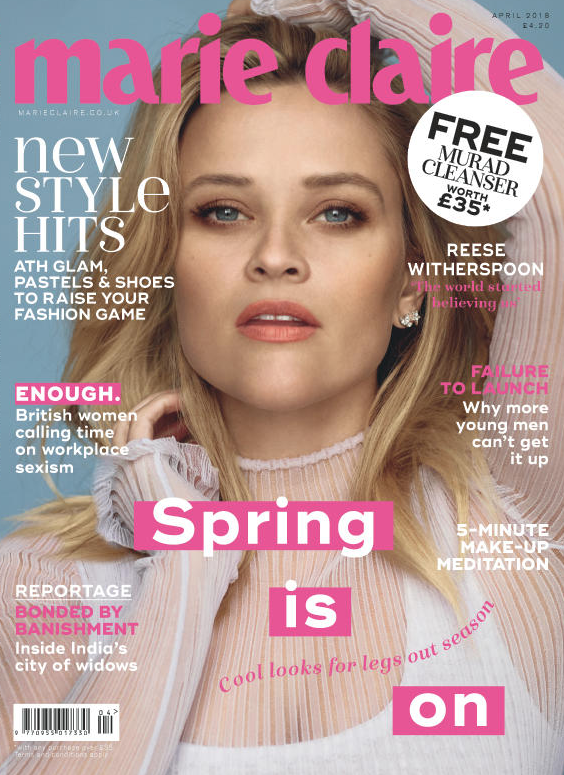
Celebrity news, beauty, fashion advice, and fascinating features, delivered straight to your inbox!
You are now subscribed
Your newsletter sign-up was successful
She's spearheaded the Time's Up initiative, has a whopping 23 projects and several successful businesses under her belt. Award-winning actress and producer Reese Witherspoon doesn't do downtime. Anne Fulenwider meets Hollywood's powerhouse
I first fell in love with Reese Witherspoon when she strutted down the halls of Harvard Law School in 2001’s Legally Blonde as Elle Woods, proving that a woman who cares about make-up and clothes can also be brilliant.
I’ve followed Witherspoon’s career ever since, from her Oscar-winning portrayal of June Carter Cash in Walk The Line (2005) to her raw performance in Wild (2014); I also recently spent an entire Saturday binge-watching the Emmy - and Golden Globe–winning Big Little Lies. Witherspoon produced the latter two projects, in addition to 2014’s Gone Girl, under the auspices of her production company, Hello Sunshine.
Her mother once told her that if you wanted a job done right, do it yourself. So, realising the persistent dearth of meaty roles for women, Reese set out to create her own opportunities, lifting other women along the way. With 23 producing projects in the works, it’s kind of a miracle she’s also running lifestyle brand Draper James and a killer book club on Instagram. So, when I heard she’d landed a role in Ava DuVernay’s adaptation of A Wrinkle In Time, I jumped at the chance to interview her.
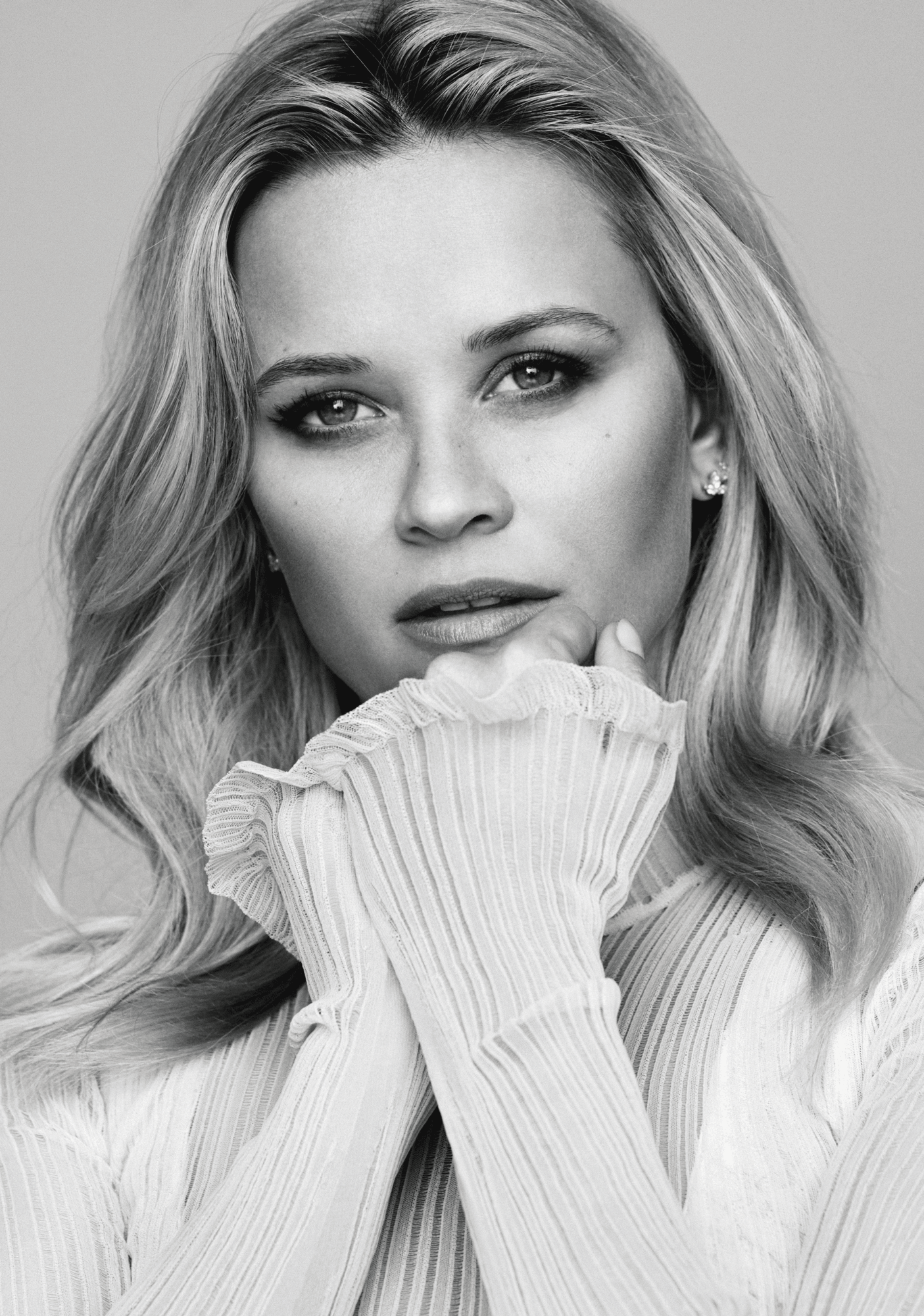
Anne Fulenwider: You’ve talked about how you’re proud of your ambition. Where do you get that from? Reese Witherspoon: I get a lot of support from my husband [Jim Toth, an agent at talent agency CAA], who cares deeply about equality, and always tells me, ‘Why wouldn’t you call the person in charge of a company and have a personal relationship with them?’ He’s encouraged me to be outspoken. Oprah encouraged me, before I ever met her, to be the best version of myself through her book clubs and the guests on her show. [She’s been] an incredible advocate for me as a businesswoman.
Anne Fulenwider: I’m obsessed with A Wrinkle In Time. I read it with my daughter about a year ago, and I was blown away. Did you read it as a child? Reese Witherspoon: I read it in sixth grade [first year of secondary school], and loved it. I thought I was Meg Murry. I didn’t know where I fitted in in the world. I knew there were bigger ideas than the place I lived, and it gave me this notion that I could accomplish things or be part of a bigger story. The book is empowering for children – they have the opportunity to change their world by changing their minds; knowing that even if you are surrounded by darkness, you are able to summon the light.
Anne Fulenwider: I love that lesson, which gets me to something that is all over the news: sexual harassment. There’s no industry that hasn’t been touched by it. Brave people have raised their voices, and now we’re witnessing a sea change and growing momentum in this movement. Are you surprised stories of sexual harassment have come out in so many more industries than Hollywood? Reese Witherspoon: Sadly, I don’t find it shocking. Women have been sharing stories in living rooms and workplaces for as long as I’ve been working. It’s just incredible that the media and the world started believing us all and listening. I was particularly moved by the women at Ford Motor Company who came forward, and by the women in my own industry who told their stories so bravely when they had nothing to gain.
Celebrity news, beauty, fashion advice, and fascinating features, delivered straight to your inbox!
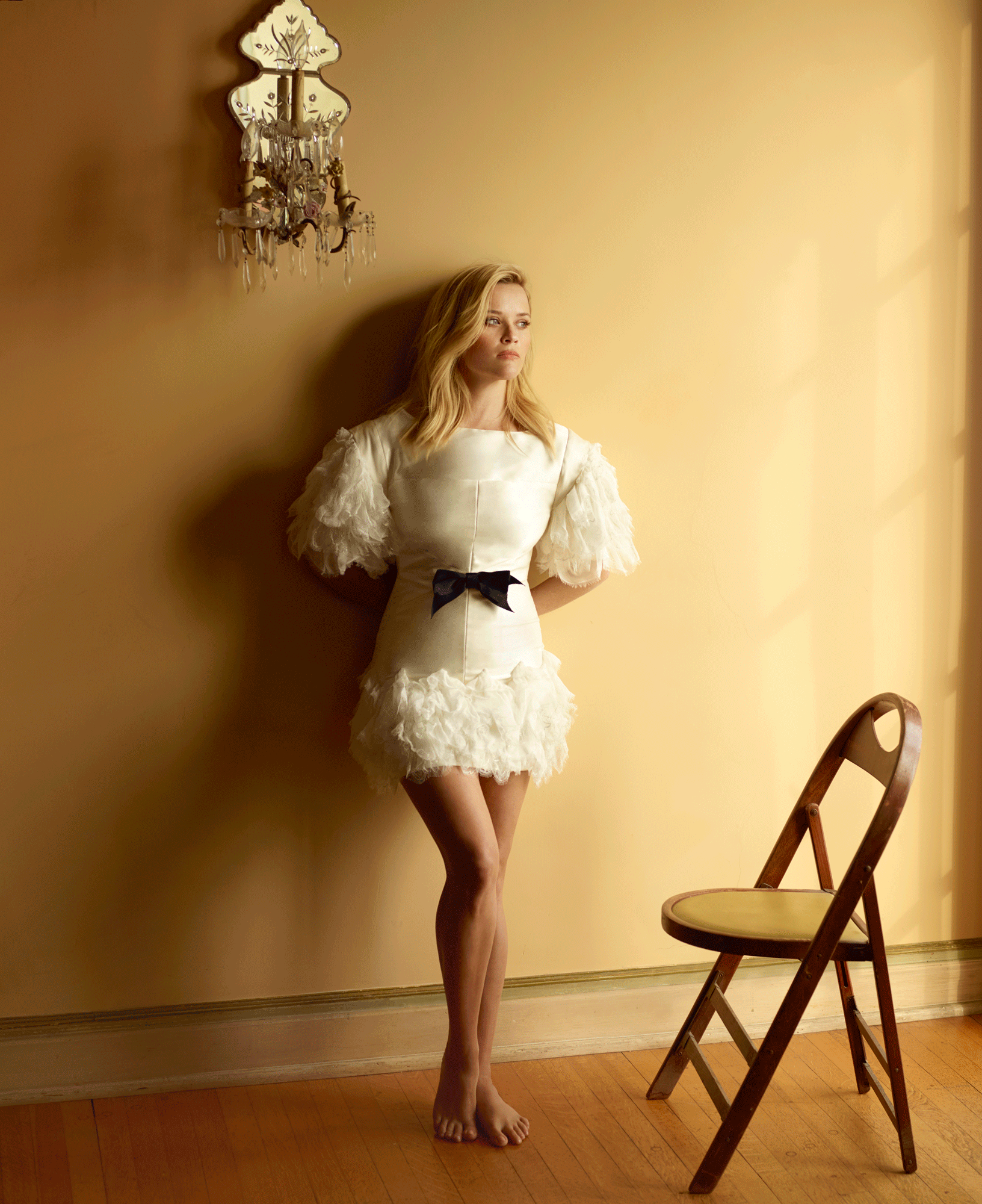
Anne Fulenwider: Why do you think so many people stayed silent about sexual harassment for so long? Reese Witherspoon: The majority of women – if they came forward – were stigmatised for reporting it, and in some cases lost their jobs. There was no reason to share your story if the results would be so punitive. That’s why I’ve been working very hard on the initiative Time’s Up with more than 400 women in my industry. We are raising money for women in a variety of workplaces to have better resources for on-the-job-harassment lawsuits. We are trying to level the playing field for all women and men who have suffered from discrimination, harassment and abuse.
AF: Do you think we will really see change now? RW: I feel a shift, completely, a reckoning of people who have been silent for so long finally coming forward and speaking out even if their voice shakes, as I know mine did when I told my story. [At an event in LA last October, Witherspoon spoke about her experiences of harassment and sexual assault, including one at the hands of a director when she was 16.] The female leaders within every industry need to stand up for those who are voiceless. We have to do better to create a balanced culture that involves more leadership from women and people of colour. It’s just profoundly overdue. [Some people] think, ‘Well, I don’t know how I can effect change.’ You can effect change by where you spend your money. We all need to be more aware of the companies we work for and those that we do business with, because the consumer is very powerful in this world of social media. Some companies are doing well with inclusion and diversity – those industries thrive, and abuse goes down when you have more balance at the top.
AF: Consumers know what they want, and it’s not always what the people in charge think. Look at the success of Wonder Woman and your projects – Wild, Gone Girl and Big Little Lies. I still can’t believe there were people telling you, ‘We don’t really do women’s stories.’ RW: ‘We don’t make movies about women; we don’t make biopics about women.’ I’ve had that said to my face. One guy said, ‘That’s just not a fresh idea.’ I said, ‘Telling a story that’s never been told – you don’t think that’s a fresh idea?’ And he said, ‘It’s just not for us.’ OK, well I’m going to take it to a company where it is for them.’
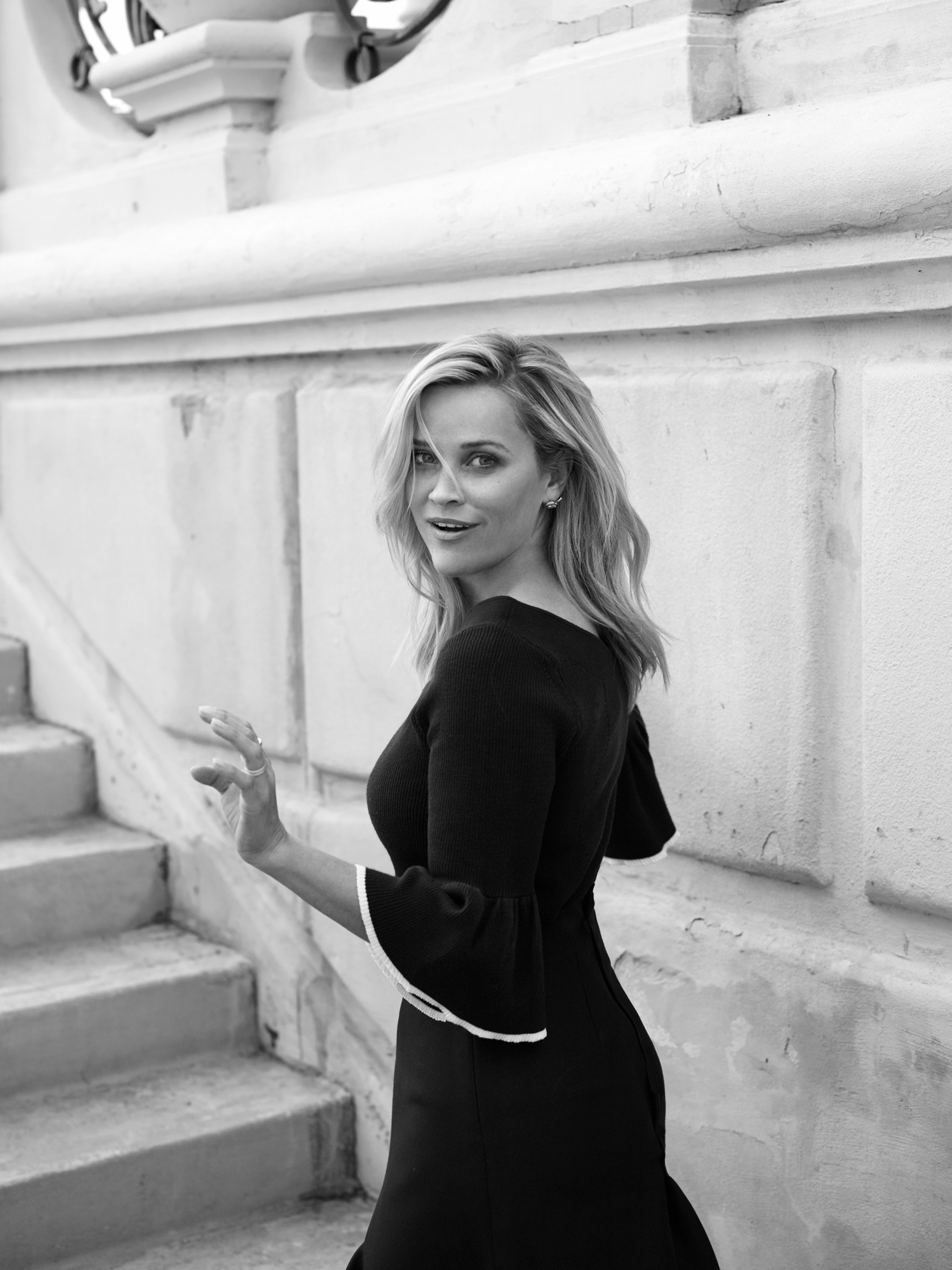
AF: One of the most powerful things about all of this to me, and certainly about what you’re doing, is the financial success. That must be a big, ‘see, told you so’ moment. RW: I have to say, it shouldn’t just be about financial success. Girls Trip, Wonder Woman, The Handmaid’s Tale – 2017 was a good year of wins. That’s not to say there aren’t times when the movie or show doesn’t work, but it shouldn’t be part of a narrative that is suddenly, ‘Women’s projects don’t work.’ And that’s what happens frequently. [For] female directors, if their movie doesn’t work, they don’t get hired again. We should have as many opportunities to fail as we do to succeed. Artistry is not about always succeeding; it’s about having the courage to put out new ideas into the world.
AF: You currently have 23 projects. There’s something about Barbie, a TV show with Jennifer Aniston and A White Lie with Zendaya. What’s at the top of your mind right now? RW: I’m excited about the project with Jen Aniston. It will be one of the first TV shows out of Apple. It’s about women in media – morning news, in particular. Zendaya and I are producing a movie based on a book I brought to her and writer Monica Beletsky, called The Gilded Years [by Karin Tanabe]. It’s about the first African-American woman who graduated from Vassar College [in New York]. She was passing as white, but was identified as an African-American woman and subsequently had to go before a committee to graduate. It’s important to go back in time so that my daughter’s and Zendaya’s generation realise that these were hard-fought wins for humankind, and that the brave people at the centre of them were women and people of colour. There’s so much more progress to be made, but this younger generation is very vocal. I don’t know if I would have had half their courage at their age.
AF: Really? Many of us feel that way about you and your courage in telling these stories. RW: But it took time for me to feel like I could step up and own my own business and fund my own company. It was terrifying, like, ‘Is anybody going to believe in me?’
AF: When are you ever terrified? RW: Every time I make a movie or a choice. I see [fear] as this little creature that lives in my life all the time, and I can either pay it attention and not get anything done or I can ignore it. Sometimes that’s not a good thing, and sometimes it is, but sometimes I just have to jump two feet into a cold pool and go, ‘OK, I believe in myself enough. I know I work hard; I can always bet on myself.’
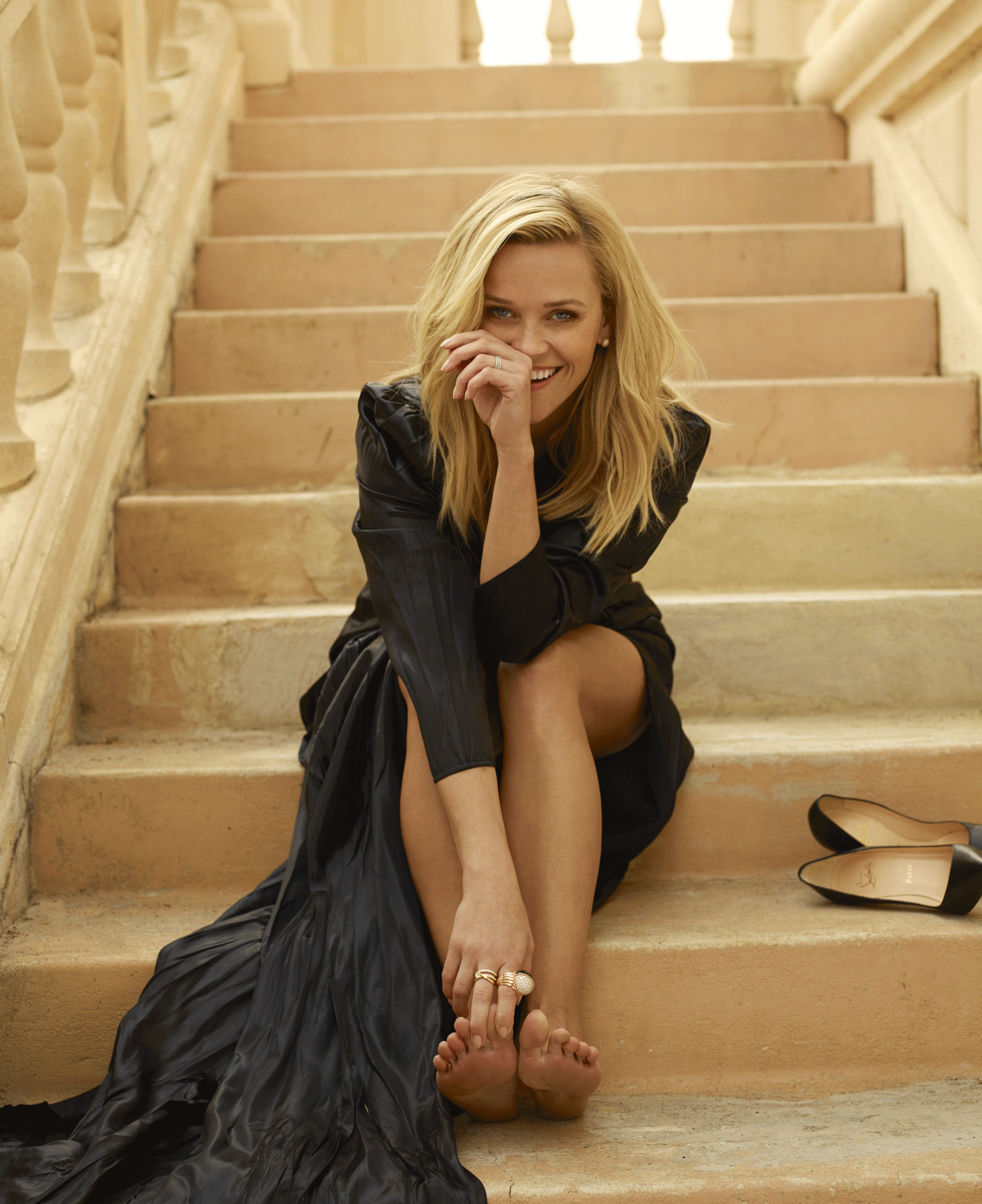
AF: What are your tips for ignoring fear? RW: I was born like that. I used to jump off the top of the stairs; in school I’d tell off the teacher because I didn’t think her curriculum was difficult enough. I was 17, I was not nice, and I was reprimanded for it. I said, ‘What was I reprimanded for? I want to be challenged.’ And my mom said to me, ‘Reese, I love your passion, but there’s a time and a place.’ Over time, I’ve had to learn to be measured and consider how my words affect people. That part comes with age.
AF: That need to be polite – the feeling that you can’t offend or stick out too much – is what holds me back sometimes. RW: There’s a difference between someone who is aggressive and makes demands, and someone who is assertive about their own worth. We live in a world where we’re told we’re worthless in marketplaces where we make less, so there’s this inherent idea that we are worth less. Not worthless – worth less. And that needs to be considered when we work on creating corporate culture reflective of society, or just the way we talk to women.
AF: Your new job at Elizabeth Arden has the best title I’ve ever heard: storyteller-in-chief. Did you make that title up? RW: They asked me if I liked it, and I was like, ‘Yes, I do because I always wanted to be a storyteller when I was little.’ All I did was tell stories in different voices, so this is a natural progression for me. I’m inspired by [Arden’s] story. She was at the forefront of the suffrage movement, handing out red lipstick to create solidarity between women. I thought [that] was so cool.

AF: Tell me about the ‘March On’ part of it. RW: The focus is on women helping women. March On is a philanthropic campaign to help promote gender equality. Elizabeth Arden is all about empowering women in the workplace, so that’s a big part of its initiative.
AF: I read a story in which you said, ‘I’m sick of being bashful. I’m over it.’ I really can’t imagine you being bashful. RW: I’ve never been really bashful, but what I was trying to say is I see a culture where men are not afraid to speak up about their accomplishments, and I don’t see one where women do – and if they do, they’re told to temper it with pleasantries or say it in a nice way. You don’t have to be a jerk about it, but we could all be 25 per cent more assertive about what we are good at because, God knows, I’m not good at some things.’
AF: What are you not good at? RW: Well, basketball. Certain aspects of physics elude me. I know what I’m good at, and there’s no sense in diminishing my capacity just to make other people feel comfortable.
A Wrinkle In Time is in cinemas nationwide from 23 March
The leading destination for fashion, beauty, shopping and finger-on-the-pulse views on the latest issues. Marie Claire's travel content helps you delight in discovering new destinations around the globe, offering a unique – and sometimes unchartered – travel experience. From new hotel openings to the destinations tipped to take over our travel calendars, this iconic name has it covered.